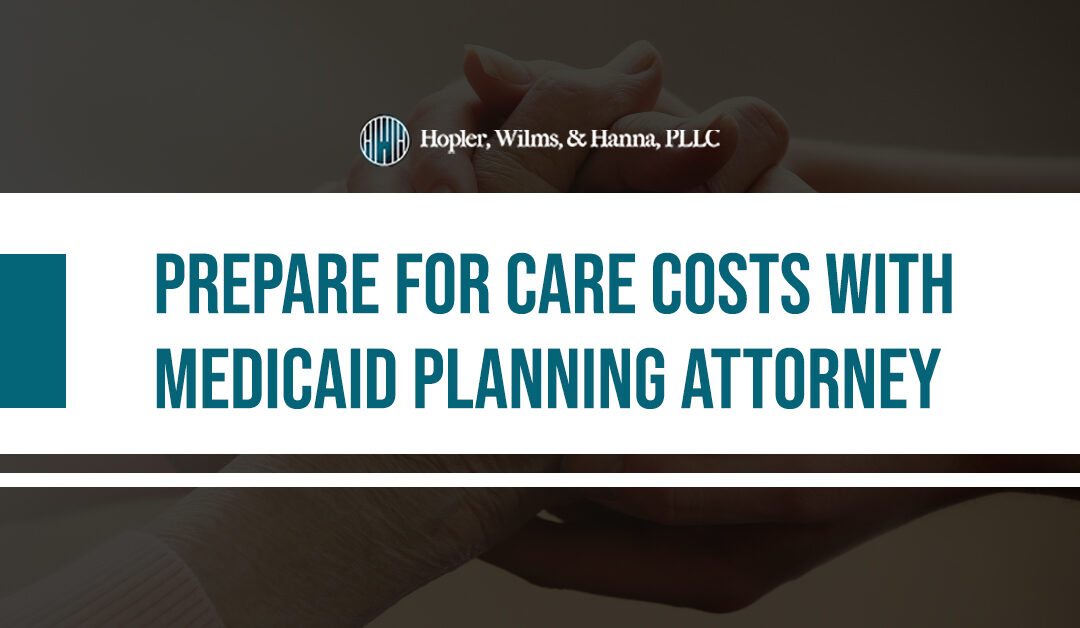As we age, many of us will require long-term care at some point in our lives. However, the cost of such care can be astronomical, and without proper planning, it can quickly deplete a family’s savings. Medicaid is a federal program that can help cover long-term care costs. However, qualifying for it can be complex and confusing. Let’s see how a Medicaid planning attorney can help you prepare for long-term care and navigate the often-complicated Medicaid application process.
The Rising Nursing Home Costs You May Face
As the population ages, the need for long-term care continues to grow. According to the U.S. Department of Health and Human Services, 70% of people turning 65 will require long-term care in their lifetime. The cost of long-term care, particularly nursing home care, has been steadily increasing in recent years.
According to a 2020 survey by Genworth Financial, the median monthly cost of a private room in a nursing home in the United States is $8,821. This is an increase of 44% from $6,085/mo in 2004. The cost of a semi-private room is slightly lower at $7,756/mo. Some estimates suggest a private room in a nursing home could reach $14,000 per month by 2035.
Assisted living facilities offer a less intensive level of care than nursing homes but can still cost significant amounts. According to the same Genworth Financial survey, the median monthly assisted living cost in the US is $4,300/mo. This is a 54% increase from $2,788/mo in 2004. Some estimates suggest that the median cost could reach $6,000/mo by 2030.
In-home nursing care can be more affordable. However, according to the same Genworth Financial survey, the cost of a home health aide in the United States is $24/hr. This is a 36% increase from $17.50/hr in 2004. Some estimates suggest the median hourly cost of a home health aide could reach $35 per hour by 2035.
The cost of long-term care, particularly nursing home care, continues to rise. This makes it essential for individuals to plan ahead. Consider options for financing long-term care, such as long-term care insurance or Medicaid planning.
If you choose to privately pay for all long-term care costs, you may lose a substantial portion (if not all) of your savings.

Doesn’t Medicare Cover Long-Term Care Costs?
Medicare is a federal health insurance program that provides coverage to individuals disabled or 65 or older. While Medicare provides coverage for many medical expenses, it does not typically cover long-term care costs.
Medicare may provide coverage for certain types of long-term care, but only in limited circumstances for a limited time. For example, Medicare may cover up to 100 days of skilled nursing care per benefit period for specific issues.
This coverage is typically only for individuals who spent at least three consecutive days in the hospital and require skilled nursing care daily. Medicare coverage for skilled nursing care requires progress toward recovery goals. It also only covers medically necessary care.
In addition to skilled nursing care, Medicare may also provide coverage for hospice care. Hospice care provides comfort and support to individuals who are terminally ill with a life expectancy of six months or less.
Medicare may provide coverage for certain types of long-term care, but it is not a comprehensive solution for long-term care costs.
What About Health Insurance? Won’t It Pay for My Medical Needs Long-Term?
When it comes to long-term assisted care, health insurance coverage varies depending on the insurance plan and medical needs. In general, health insurance will cover medical expenses that are considered medically necessary. However, it may not cover custodial costs, such as help with activities of daily living.
Many health insurance plans provide skilled nursing care coverage. Skilled nursing care includes wound care, medication management, and rehabilitation services. However, coverage for this care is limited and may require prior authorization.
Health insurance doesn’t generally cover assisted living facilities. These care facilities provide help with activities of daily living, such as bathing, dressing, and eating.
Long-term care insurance may provide coverage for long-term assisted care, including assisted living facilities. However, long-term care insurance policies vary in scope and cost, and may have limitations on pre-existing conditions.
Limitation of Health Insurance Coverage
Many health insurance plans have limitations on coverage for mental health services. This includes coverage for psychiatric care and counseling. This can be particularly relevant if you require long-term assisted care for a mental health condition such as Alzheimer’s disease.
While health insurance plans may provide some coverage for skilled nursing care, coverage for assisted living facilities and in-home care is generally limited. Consider other options for financing long-term assisted care expenses, such as using your savings (not recommended) or Medicaid planning. An experienced elder law attorney working in Medicaid planning can help.
How Can Medicaid Benefits Help?
Medicaid is a joint federal and State program providing coverage for long-term care services. Eligibility for Medicaid depends on several factors, including income, assets, and medical needs. Once individuals qualify for Medicaid, they may be eligible for a range of long-term care services.
Medicaid coverage for long-term care can include a variety of services, such as:
- Nursing home care
- Home health care
- Personal care services
Nursing home care is typically the most commonly covered long-term care service under Medicaid. Medicaid may cover the total cost of nursing home care or require the individual to contribute based on their income and assets.
In addition to nursing home care, Medicaid may also provide coverage for home health care services, such as the following:
- Skilled nursing care
- Physical therapy
- Occupational therapy
- Personal care services: including help with activities of daily living, such as bathing, dressing, and eating.
For individuals who require long-term care, Medicaid is often the best option for financing care expenses.
How Can I Qualify For Medicaid Benefits Without Spending Down My Savings?
Qualifying for Medicaid benefits can be challenging because it is a need-based program. It is challenging if you have significant savings or assets.
One way to protect savings from counting against you is by setting up a Medicaid trust. A Medicaid trust can make your savings non-countable assets for purposes of Medicaid eligibility.
A Medicaid trust, also known as a Medicaid Asset Protection Trust (MAPT), is a legal tool that allows an individual to transfer assets into a trust that a trustee manages. The assets in the trust are then protected from counting against Medicaid eligibility requirements.
Proper Set Up of a Medicaid Trust Is Essential
When setting up a Medicaid trust, it is crucial to work with an experienced attorney who can ensure that the trust is structured in a way that complies with Medicaid rules and regulations. Certain limitations exist on the types of assets that can be transferred into a Medicaid trust, and there may be tax implications associated with transferring assets.
Watch Out for the Five-Year Look-Back Period
It’s also crucial to note that there is a five-year look-back period for Medicaid eligibility. Any transfers of assets made to family members or others within five years of your Medicaid application may result in a penalty period. A penalty period is when you may be ineligible for Medicaid benefits.
During the five years before filling out Medicaid applications, you can only sell assets at fair market value if you want to qualify for Medicaid in the near future. Giving them away or selling them for less than their value can bring ineligibility.
Avoiding a Medicaid Spend-Down With a Medicaid Asset Planning Trust (MAPT)
Another option to qualify for Medicaid benefits is through a Medicaid spend-down. A spend-down is a process by which an individual can use their income and assets to pay for medical expenses to meet Medicaid eligibility requirements.
Under Medicaid law, you may spend down your assets by deducting certain medical expenses, such as hospital bills or prescription drug costs, from your income or assets. A spend-down allows you to meet the Medicaid income or asset requirements. During a spend-down, you are not protecting your assets. Instead, you are spending your retirement monies and hard-earned savings to become financially eligible for Medicaid coverage.
During a spend down, you’ll need to carefully track and document all medical expenses that may help you qualify for Medicaid later. Giving your life savings or items of value to a family member can result in a penalty period barring you from Medicaid coverage. So if you think you can give your assets to your children and escape the spend-down, that strategy won’t work.
How Much Income and Assets Is Okay to Qualify for Medicaid?
Medicaid may allow you or a healthy spouse a monthly income while you are a Medicaid recipient under Federal law. As of May 2023, the income and asset limits for North Carolina Medicaid are as follows:
For individuals who are aged, blind, or disabled, the income limit is $1,187 per month. For couples aged, blind, or disabled, the income limit is $1,593 per month.
For a single person who requires nursing home care, the asset limit is $2,000. For a married couple requiring nursing home care, the asset limit is $3,000.
For individuals who require home and community-based services, such as home health care or personal care services, the asset limit is $2,000. For married couples who need home and community-based services, the combined assets are $3,000.
When one spouse needs care and the other does not, the applicant’s asset limit is $2,000. The healthy “community spouse” (non-applicant spouse) may retain up to 50% of the couple’s assets up to a maximum of $148,620. If the non-applicant’s half of the assets is under $29,724, the non-applicant spouse may keep 100% of the assets. (1)
Non-Countable Assets Do Not Count Against Your Asset Limit
It is important to note that certain assets do not count toward the asset limit. Exempt or non-countable assets, such as a primary residence (worth up to $688,000), a vehicle, and personal property, are not counted towards the asset limit.
You can also spend income or assets on home improvements such as a new roof, appliances, etc., or home modifications such as wheelchair ramps, lift assistance bars, elevators, and new door knobs. You may also prepay funeral and burial expenses or pay off debt. These expenses do not bring a penalty period. (2)
Income and asset limits for North Carolina Medicaid vary depending on an individual’s age, disability status, and the type of long-term care services needed. Working with an experienced Medicaid planning elder law attorney is essential to ensure that a correct Medicaid application process complies with Medicaid rules and regulations.
How Can I Prevent My Family From Needing to Pay Back Medicaid?
Another reason to do Medicaid planning with your attorney is the Medicaid pay-back program. The Medicaid program in North Carolina seeks to recoup the expenses the State paid out to cover your care.
According to Medicaid laws, your estate receives a bill when you pass away. Many families are forced to sell the family home to cover your nursing home stay. You can avoid your family’s loss of your remaining assets with proper planning with your elder law attorney.

